外研版(2019)选择性必修第一册Unit 2 Onwards and upwards Understanding ideas 课件(共27张PPT)
文档属性
| 名称 | 外研版(2019)选择性必修第一册Unit 2 Onwards and upwards Understanding ideas 课件(共27张PPT) | 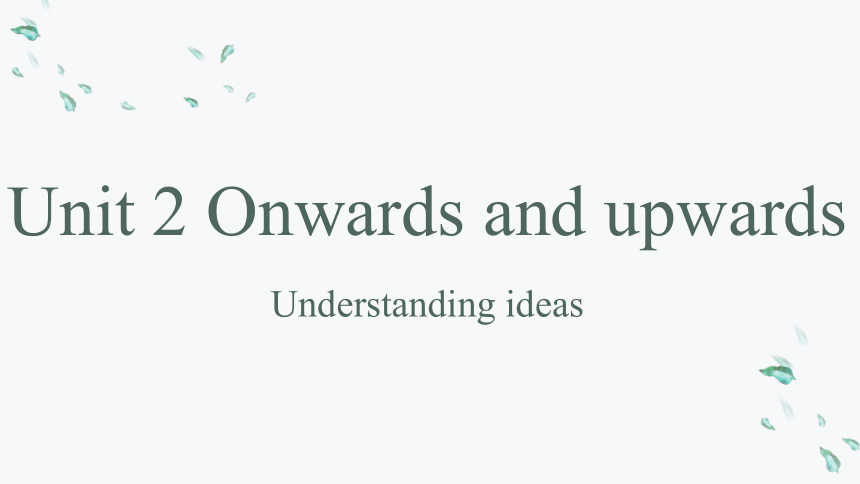 | |
| 格式 | pptx | ||
| 文件大小 | 5.9MB | ||
| 资源类型 | 教案 | ||
| 版本资源 | 外研版(2019) | ||
| 科目 | 英语 | ||
| 更新时间 | 2023-10-24 17:40:58 | ||
图片预览


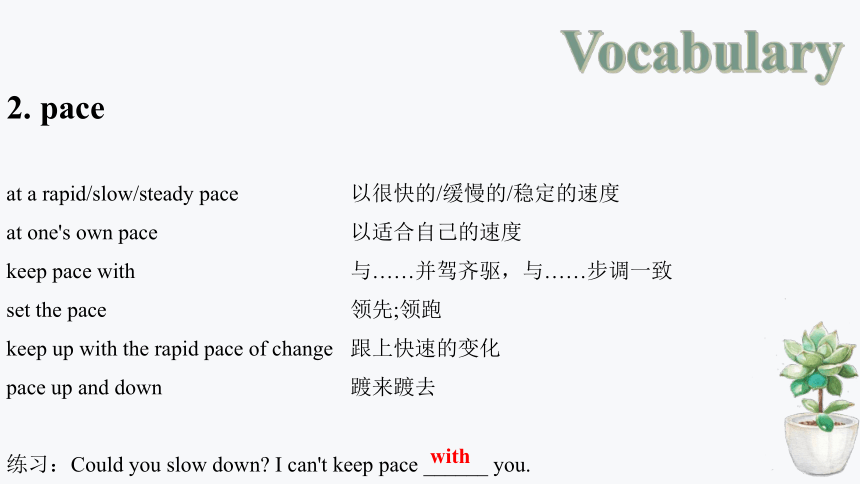

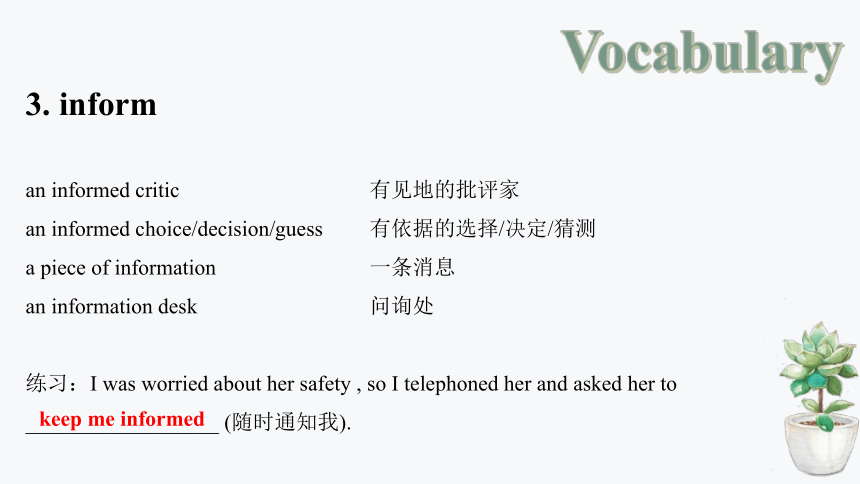
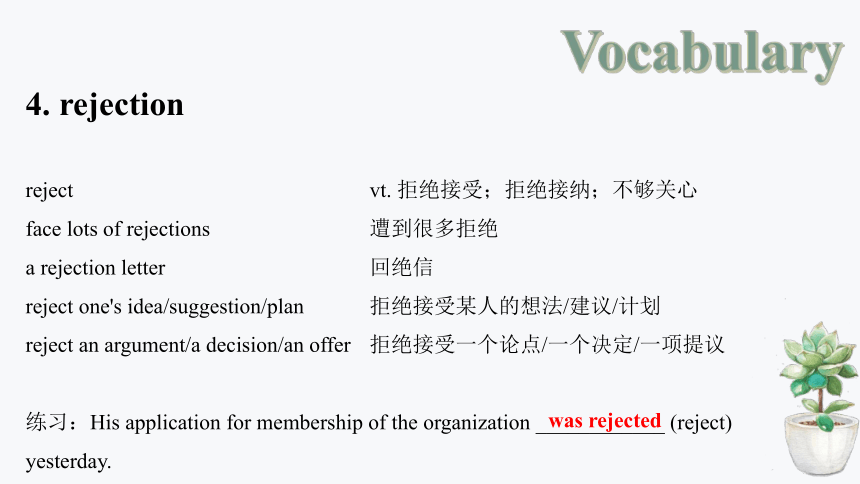
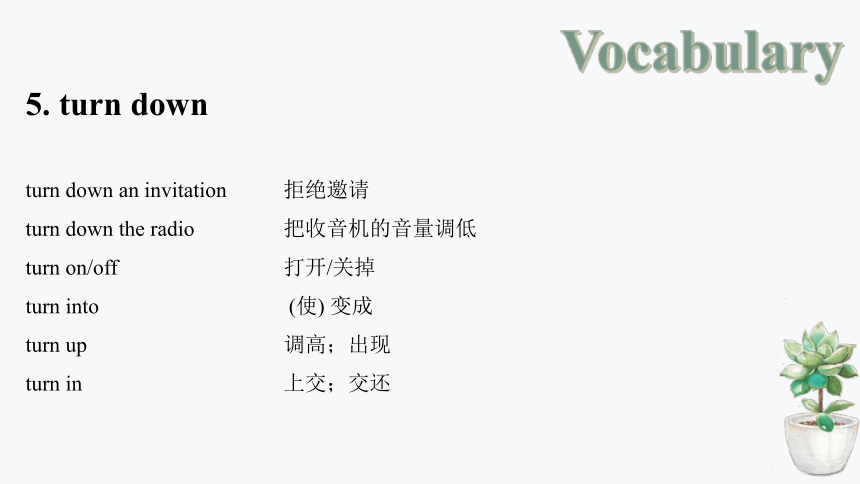
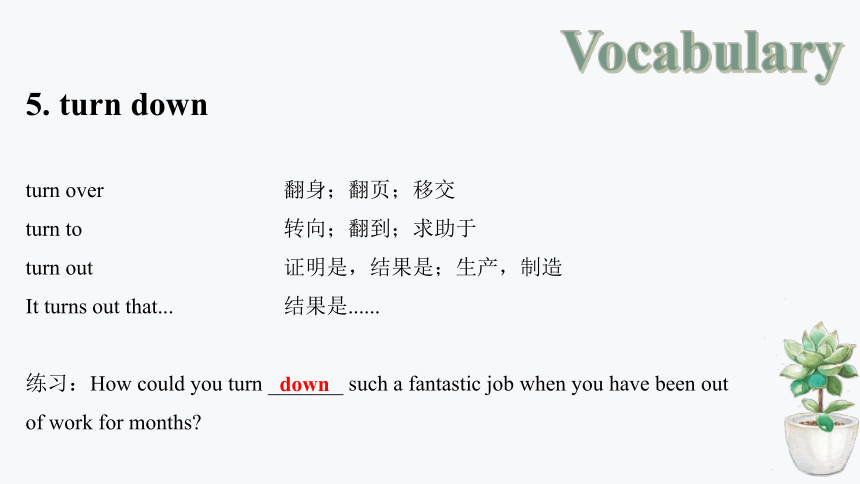
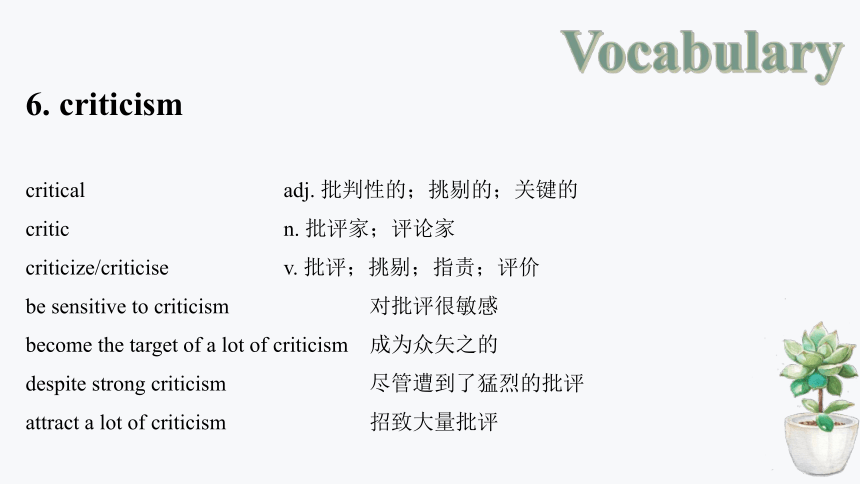
文档简介
(共27张PPT)
Unit 2 Onwards and upwards
Understanding ideas
Vocabulary
1. debts
be in one's debt (= be in debt to sb.) 欠某人的人情债;受某人的恩惠
put sb.in debt 使某人陷入债务
in debt 负债(表示态)
out of debt 不负债(表示状态)
get/fall/run into debt 负债,陷入债务之中(表示动作)
pay off one's debts 还清某人的债务(表示动作)
练习:They will send kids to college whatever it takes , even if that means huge _______ (debt).
debts
Vocabulary
2. pace
at a rapid/slow/steady pace 以很快的/缓慢的/稳定的速度
at one's own pace 以适合自己的速度
keep pace with 与……并驾齐驱,与……步调一致
set the pace 领先;领跑
keep up with the rapid pace of change 跟上快速的变化
pace up and down 踱来踱去
练习:Could you slow down I can't keep pace ______ you.
with
Vocabulary
3. inform
informed adj. 有学问的;有见识的
information n.资料;消息
inform sb. of/about sth. 通知某人某事
inform sb. that... 通知某人......
keep sb. informed 不断给某人提供最新信息
be well informed about… 很了解......
Vocabulary
3. inform
an informed critic 有见地的批评家
an informed choice/decision/guess 有依据的选择/决定/猜测
a piece of information 一条消息
an information desk 问询处
练习:I was worried about her safety , so I telephoned her and asked her to __________________ (随时通知我).
keep me informed
Vocabulary
4. rejection
reject vt. 拒绝接受;拒绝接纳;不够关心
face lots of rejections 遭到很多拒绝
a rejection letter 回绝信
reject one's idea/suggestion/plan 拒绝接受某人的想法/建议/计划
reject an argument/a decision/an offer 拒绝接受一个论点/一个决定/一项提议
练习:His application for membership of the organization ____________ (reject) yesterday.
was rejected
Vocabulary
5. turn down
turn down an invitation 拒绝邀请
turn down the radio 把收音机的音量调低
turn on/off 打开/关掉
turn into (使) 变成
turn up 调高;出现
turn in 上交;交还
Vocabulary
5. turn down
turn over 翻身;翻页;移交
turn to 转向;翻到;求助于
turn out 证明是,结果是;生产,制造
It turns out that... 结果是......
练习:How could you turn _______ such a fantastic job when you have been out of work for months
down
Vocabulary
6. criticism
critical adj. 批判性的;挑剔的;关键的
critic n. 批评家;评论家
criticize/criticise v. 批评;挑剔;指责;评价
be sensitive to criticism 对批评很敏感
become the target of a lot of criticism 成为众矢之的
despite strong criticism 尽管遭到了猛烈的批评
attract a lot of criticism 招致大量批评
Vocabulary
6. criticism
be critical of sb./sth. 批评某人/某事
be critical to 对……至关重要
criticize sb. for (doing) sth. 因(做)某事批评某人
练习:His comments were bound to attract __________ (criticize)
criticism
Vocabulary
7. get sth. done
get sb./sth. to do sth. 让某人/某物做某事
get sb./sth. doing sth. 使某人/某物处于某种动作状态下
get sb./sth. + adj. 使某人/某物处于某种状态
have sth. done (=get sth.done) 使某事被做;请/让别人做某事;遭遇某事
have/make sb. do sth. (=get sb.to do sth.) 让某人做某事
have sth. to do 有某事要做(have是实义动词“有”)
练习:I can't stand here talking I have work ___________ (do).
to do
Vocabulary
8. guarantee
guarantee to do sth. 保证做某事
guarantee that... 保证......
guarantee sb. sth. 保证某人获得某物
be guaranteed to do sth. 肯定会做某事
under guarantee 在保修期内
练习:Can you ___________________ (保证给我一份工作) when I get there
guarantee me a job
Lead-in
Activity 1. Research these writers online and match them to the information.
Understanding ideas
Answer:
1. J.K. Rowling
2. J.D. Salinger
3. Emily Brontё
Understanding ideas
Share anything else they know about these writers with the class.
Understanding ideas
Read the passage quickly and match the paragraphs to the main ideas.
Para.1 A. As women,the success of Bronte sisters is full of hardships.
Para.2 B. After many rejections, J.K. Rowling succeeded at last.
Para.3 C. Many writers often receive rejections of their works.
Para.4 D. Perseverance is the key to success.
Para.5 E. Although facing criticism, J.D. Salinger didn't give up.
Understanding ideas
Read the passage again and choose the best answers:
①What can you learn from the first paragraph
A. As long as we stick to writing, we all become writers
B. It is very normal for many writers to receive rejections of their works.
C. The publisher's reply will be a delight to the author
D. The more successful a writer is, the more rejection letters he/she receives.
Understanding ideas
②How did J.K. Rowling react when she received her first rejection letter
A. She thought her book was too difficult for children.
B. She no longer wanted to be a writer again.
C. She continued to write her novel all her time.
D. She decided to print 500 copies of her first books
③Why did J.D. Salinger carry six chapters of his book with him
A. He wanted to relax himself on the battlefield.
B. He wanted to read his book to his comrades.
C. He knew that his book would be loved by the soldiers.
D. He did not give up his dream of writing his book.
Understanding ideas
④Who wrote the novel Jane Eyre
A. Charlotte Bronte.
B. Robert Southey
C. Anne Bronte
D. Emily Bronte.
⑤What does the author think is the most important factor to success
A. Perseverance.
B. Talent.
C. Publisher.
D. Rejection.
Understanding ideas
Complete Activity 3 on Page 20.
Choose another suitable title for the passage and give their reasons.
①Life Is Hard for Female Writers
②Good Things Come to Those Who Wait
③Never Give Up on Your Dreams
④Successful Writers
Understanding ideas
Complete Activity 4 on Page 2l.
Understanding ideas
Suggested answers:
Introduction: A lot of successful writers have previously faced rejection.
Example 1:
Writer: J.K. Rowling
Best known for: Harry Potter
Experience of rejection: She was told that her book was told difficult and too long for children and it was rejected twelve times by publishers.
Eventual outcome: Harry Potter became a global success.
Understanding ideas
Suggested answers:
Example 2:
Writer: J.D. Salinger
Best known for: The Catcher in the Rye
Experience of rejection: He received criticism and rejections from several publishers.
Eventual outcome: The Catcher in the Rye became an immediate best-seller after it was published.
Understanding ideas
Suggested answers:
Example 3:
Writers: Bronte sisters
Best known for: Jane Eyre, Wuthering Heights and Agnes Grey
Experience of rejection: Women were not encouraged to become writers at that time. Their book of poems which they wrote under male names sold only two copies.
Eventual outcome: Their novels are regarded as classics of world literature.
Conclusion: Perseverance is the key to success.
Understanding ideas
Understanding ideas
Suggestion answers:
We regret to inform you that your book is rejected/turned down/refused...
We are delighted to inform you that your book is accepted/well-received...
"We regret to inform you..."comes from the first paragraph.
"We are delighted to inform you..." comes from the last paragraph.
The author intends to begin with the negative theme of rejection, but then reveal that perseverance can turn a bad beginning into a good ending. Or rather success comes to those who don't give up. In addition, the passage is made complete by the way in which the first sentence is mirrored by the last sentence.
Thank you!
Unit 2 Onwards and upwards
Understanding ideas
Vocabulary
1. debts
be in one's debt (= be in debt to sb.) 欠某人的人情债;受某人的恩惠
put sb.in debt 使某人陷入债务
in debt 负债(表示态)
out of debt 不负债(表示状态)
get/fall/run into debt 负债,陷入债务之中(表示动作)
pay off one's debts 还清某人的债务(表示动作)
练习:They will send kids to college whatever it takes , even if that means huge _______ (debt).
debts
Vocabulary
2. pace
at a rapid/slow/steady pace 以很快的/缓慢的/稳定的速度
at one's own pace 以适合自己的速度
keep pace with 与……并驾齐驱,与……步调一致
set the pace 领先;领跑
keep up with the rapid pace of change 跟上快速的变化
pace up and down 踱来踱去
练习:Could you slow down I can't keep pace ______ you.
with
Vocabulary
3. inform
informed adj. 有学问的;有见识的
information n.资料;消息
inform sb. of/about sth. 通知某人某事
inform sb. that... 通知某人......
keep sb. informed 不断给某人提供最新信息
be well informed about… 很了解......
Vocabulary
3. inform
an informed critic 有见地的批评家
an informed choice/decision/guess 有依据的选择/决定/猜测
a piece of information 一条消息
an information desk 问询处
练习:I was worried about her safety , so I telephoned her and asked her to __________________ (随时通知我).
keep me informed
Vocabulary
4. rejection
reject vt. 拒绝接受;拒绝接纳;不够关心
face lots of rejections 遭到很多拒绝
a rejection letter 回绝信
reject one's idea/suggestion/plan 拒绝接受某人的想法/建议/计划
reject an argument/a decision/an offer 拒绝接受一个论点/一个决定/一项提议
练习:His application for membership of the organization ____________ (reject) yesterday.
was rejected
Vocabulary
5. turn down
turn down an invitation 拒绝邀请
turn down the radio 把收音机的音量调低
turn on/off 打开/关掉
turn into (使) 变成
turn up 调高;出现
turn in 上交;交还
Vocabulary
5. turn down
turn over 翻身;翻页;移交
turn to 转向;翻到;求助于
turn out 证明是,结果是;生产,制造
It turns out that... 结果是......
练习:How could you turn _______ such a fantastic job when you have been out of work for months
down
Vocabulary
6. criticism
critical adj. 批判性的;挑剔的;关键的
critic n. 批评家;评论家
criticize/criticise v. 批评;挑剔;指责;评价
be sensitive to criticism 对批评很敏感
become the target of a lot of criticism 成为众矢之的
despite strong criticism 尽管遭到了猛烈的批评
attract a lot of criticism 招致大量批评
Vocabulary
6. criticism
be critical of sb./sth. 批评某人/某事
be critical to 对……至关重要
criticize sb. for (doing) sth. 因(做)某事批评某人
练习:His comments were bound to attract __________ (criticize)
criticism
Vocabulary
7. get sth. done
get sb./sth. to do sth. 让某人/某物做某事
get sb./sth. doing sth. 使某人/某物处于某种动作状态下
get sb./sth. + adj. 使某人/某物处于某种状态
have sth. done (=get sth.done) 使某事被做;请/让别人做某事;遭遇某事
have/make sb. do sth. (=get sb.to do sth.) 让某人做某事
have sth. to do 有某事要做(have是实义动词“有”)
练习:I can't stand here talking I have work ___________ (do).
to do
Vocabulary
8. guarantee
guarantee to do sth. 保证做某事
guarantee that... 保证......
guarantee sb. sth. 保证某人获得某物
be guaranteed to do sth. 肯定会做某事
under guarantee 在保修期内
练习:Can you ___________________ (保证给我一份工作) when I get there
guarantee me a job
Lead-in
Activity 1. Research these writers online and match them to the information.
Understanding ideas
Answer:
1. J.K. Rowling
2. J.D. Salinger
3. Emily Brontё
Understanding ideas
Share anything else they know about these writers with the class.
Understanding ideas
Read the passage quickly and match the paragraphs to the main ideas.
Para.1 A. As women,the success of Bronte sisters is full of hardships.
Para.2 B. After many rejections, J.K. Rowling succeeded at last.
Para.3 C. Many writers often receive rejections of their works.
Para.4 D. Perseverance is the key to success.
Para.5 E. Although facing criticism, J.D. Salinger didn't give up.
Understanding ideas
Read the passage again and choose the best answers:
①What can you learn from the first paragraph
A. As long as we stick to writing, we all become writers
B. It is very normal for many writers to receive rejections of their works.
C. The publisher's reply will be a delight to the author
D. The more successful a writer is, the more rejection letters he/she receives.
Understanding ideas
②How did J.K. Rowling react when she received her first rejection letter
A. She thought her book was too difficult for children.
B. She no longer wanted to be a writer again.
C. She continued to write her novel all her time.
D. She decided to print 500 copies of her first books
③Why did J.D. Salinger carry six chapters of his book with him
A. He wanted to relax himself on the battlefield.
B. He wanted to read his book to his comrades.
C. He knew that his book would be loved by the soldiers.
D. He did not give up his dream of writing his book.
Understanding ideas
④Who wrote the novel Jane Eyre
A. Charlotte Bronte.
B. Robert Southey
C. Anne Bronte
D. Emily Bronte.
⑤What does the author think is the most important factor to success
A. Perseverance.
B. Talent.
C. Publisher.
D. Rejection.
Understanding ideas
Complete Activity 3 on Page 20.
Choose another suitable title for the passage and give their reasons.
①Life Is Hard for Female Writers
②Good Things Come to Those Who Wait
③Never Give Up on Your Dreams
④Successful Writers
Understanding ideas
Complete Activity 4 on Page 2l.
Understanding ideas
Suggested answers:
Introduction: A lot of successful writers have previously faced rejection.
Example 1:
Writer: J.K. Rowling
Best known for: Harry Potter
Experience of rejection: She was told that her book was told difficult and too long for children and it was rejected twelve times by publishers.
Eventual outcome: Harry Potter became a global success.
Understanding ideas
Suggested answers:
Example 2:
Writer: J.D. Salinger
Best known for: The Catcher in the Rye
Experience of rejection: He received criticism and rejections from several publishers.
Eventual outcome: The Catcher in the Rye became an immediate best-seller after it was published.
Understanding ideas
Suggested answers:
Example 3:
Writers: Bronte sisters
Best known for: Jane Eyre, Wuthering Heights and Agnes Grey
Experience of rejection: Women were not encouraged to become writers at that time. Their book of poems which they wrote under male names sold only two copies.
Eventual outcome: Their novels are regarded as classics of world literature.
Conclusion: Perseverance is the key to success.
Understanding ideas
Understanding ideas
Suggestion answers:
We regret to inform you that your book is rejected/turned down/refused...
We are delighted to inform you that your book is accepted/well-received...
"We regret to inform you..."comes from the first paragraph.
"We are delighted to inform you..." comes from the last paragraph.
The author intends to begin with the negative theme of rejection, but then reveal that perseverance can turn a bad beginning into a good ending. Or rather success comes to those who don't give up. In addition, the passage is made complete by the way in which the first sentence is mirrored by the last sentence.
Thank you!
